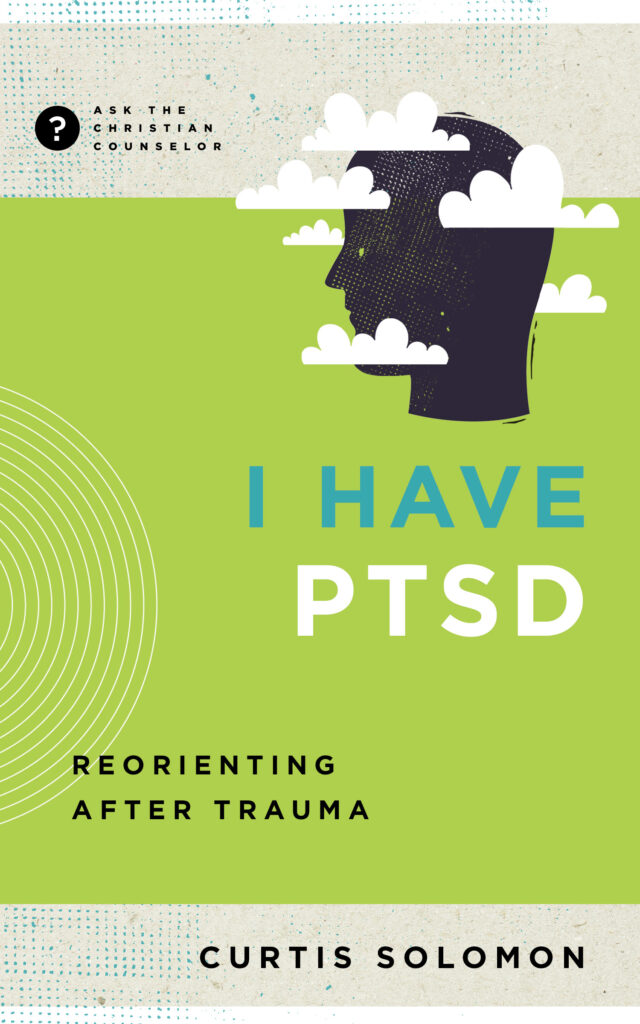Can anything be done to prevent someone from developing Post-Traumatic Stress Disorder (PTSD)? While there is no vaccination against PTSD, that doesn’t mean there is nothing to be done to help protect our kids against some of the challenges that come after a traumatic experience. We don’t have to wait until trauma strikes to prepare the hearts of our children to face the most intense forms of suffering. There is no way to completely protect our children from suffering in this world, and we can’t guarantee they won’t face lasting challenges from traumatic experiences, but the following measures can help our children be prepared to respond well to suffering.
Give Them a Good Theology of Suffering
Discipleship is an important part of the life of any Christian. Whether discipleship is taking place in the home, a Sunday School classroom, or a youth meeting, one thing our children often don’t receive as part of their training is a theology of suffering. Too often our lives are spent trying to avoid suffering at all costs. We don’t want to think or talk about pain, let alone actually suffer. But suffering is a significant and unavoidable aspect of life in a fallen world. We need to teach our children where suffering comes from, its purpose, how God uses it in our lives, and how we can deal well with hardship and pain.
Children who are raised to believe that suffering is an alien thing to be avoided at all costs will not be equipped to handle or process suffering. One element of the struggle with PTSD is the difficulty faced when one’s expectations of what life should be are confronted with the harshness and often traumatic experiences of real life. Children who have no conception of suffering often don’t know what to do with it when it comes. Even worse are children who are taught that Christians won’t suffer if they have faith and live faithfully. This is not only unrealistic but also unbiblical.
The Bible teaches that suffering will come to all people, including Christians. As a matter of fact, because Christians are members of the kingdom and family of God, the temporary ruler of this world will bring all his might against them (John 12:31; 14:30, 2 Corinthians 4:4, Ephesians 2:2).
How to Teach Kids about Suffering
We have lived long enough to know suffering is inevitable, yet we are usually surprised by difficulty, especially the severest kind. The same is true for the children in our lives. Severe trials have the potential to shake them to their core if they do not have a bedrock foundation on their identity in Christ, their purpose for being on this earth, and what to think about the storms ahead.
This is one reason Peter writes, “Beloved, do not be surprised at the fiery trial when it comes upon you to test you, as though something strange were happening to you” (1 Peter 4:12). In this context, Peter is talking about severe, life-and-death, persecution that was coming upon the church. His words in this passage teach the church to expect suffering and persecution in this lifetime.
Now I’m not advocating you sit your five-year-old down and tell her she should expect to be burned at the stake for following Jesus. But you should also not tell her everything is always going to go her way, and that this life is not about getting pleasure and avoiding pain. In wise and appropriate ways, teach the truths of the following passages to your children:
- 1 Peter 2:21: “For to this you have been called, because Christ also suffered for you, leaving you an example, so that you might follow in his steps.”
- John 15:20: “Remember the word that I said to you: ‘A servant is not greater than his master.’ If they persecuted me, they will also persecute you. If they kept my word, they will also keep yours.”
- John 16:33: “I have said these things to you, that in me you may have peace. In the world you will have tribulation. But take heart; I have overcome the world.”
- 2 Timothy 3:12: “Indeed, all who desire to live a godly life in Christ Jesus will be persecuted.”
- Romans 8:16–17 “The Spirit himself bears witness with our spirit that we are children of God, and if children, then heirs—heirs of God and fellow heirs with Christ, provided we suffer with him in order that we may also be glorified with him.”
- Acts 14:21–22: “When they had preached the gospel to that city and had made many disciples, they returned to Lystra and to Iconium and to Antioch, strengthening the souls of the disciples, encouraging them to continue in the faith, and saying that through many tribulations we must enter the kingdom of God.”
You can also share biographies and testimonies of Christians who have gone before us facing persecution and even martyrdom. Our children have been greatly encouraged and blessed by The Torchlighters. It is a series of short, animated films about the lives of missionaries and martyrs throughout church history. It portrays the reality that God’s love and faithfulness to his people does not guarantee he will deliver them from pain and suffering, but he will be with them through it.
Don’t Always Stand in the Way of Their Pain
No parent wants to see his child in pain. Protection is a good impulse. But we can sometimes go too far in protection in an attempt to eliminate any form of suffering. Some parents avoid discipline because they don’t want to inflict pain. Some parents will swoop in at the last minute to complete a child’s homework because they don’t want their child’s grade to suffer and inhibit future opportunities. Both of these reactions short-circuit valuable life lessons and the fact that God wove cause and effect into the fabric of his creation. Parents “come to the rescue” thinking they will save their children from suffering, but in reality, they are delaying and magnifying the pain that will eventually come. The child who never learns to say, “No” to his desires will likely face much worse consequences as an adult than he ever would have as a child. The child who grows up having all her difficult work done for her will have to learn responsibility in much more challenging environments than a “safe” home.
Suffering doesn’t only come from sinful or foolish living. It also comes as the natural pattern of life in a fallen world. While we don’t want our children to experience things that leave lasting harm if we can help it, we need to let them experience some of the less severe pain that comes with life while they are under our protection so we can teach them how to respond. As Bruce Wayne (a.k.a. Batman) learned from his father and butler in Batman Begins, “Why do we fall down? So we can learn to get back up again.”
Parents can also help children build resilience by imposing difficult challenges that prepare them for hard things. The apostle Paul tells the Christians in Corinth, “I discipline my body and keep it under control, lest after preaching to others I myself should be disqualified” (1 Corinthians 9:27). He intentionally inflicts hardship on himself as a form of self-discipline to strengthen self-control and fight against self-indulgence.
Help Them Celebrate the Fruit of Suffering
Suffering in the life of a believer will produce good fruit. God’s Word promises us that no suffering occurs in vain (Romans 5:3 –5; 8: 28–29; James 1:2–4). God uses all of it to grow his children. He uses it to make all his sons and daughters more like his only begotten Son.
Children need to be taught this truth so they understand God’s greater purposes in allowing them to experience pain. Don’t just teach them the principle—teach them to look for and find the fruit of God’s work in their lives. Have you seen them become more patient, more generous with others, or complain less? Point out growth when you see it then take time to celebrate that growth and praise God for it. This can help them have a category for post-traumatic sanctification (or post-traumatic growth) if they ever encounter trauma. They will have a paradigm for understanding that God can mold them and shape them even through the most severe suffering of their lives.
Point Them to Jesus
Becoming like Jesus through suffering is only promised to those who are his followers. The most important preparation to face suffering well is to have a relationship with Jesus based on faith in his life and work as our Savior. As you shepherd the children in your life, be sure to proclaim the gospel to them again and again. Help establish them firmly in the faith and then show how the gospel applies to all of life on a daily basis, even the dark moments of pain and suffering.
Having pointed children to Jesus as Savior, it is also helpful to point to him as an example of how to suffer faithfully. We see this principle in 1 Peter 2:21:“For to this you have been called, because Christ also suffered for you, leaving you an example, so that you might follow in his steps.” As you read the Gospels with children, highlight many of the ways Jesus suffered in his earthly ministry. He experienced a life of poverty being raised by poor parents, was teased by his siblings, and wrongly disciplined by his parents. He experienced exhaustion, hunger, and pain. He was misunderstood, tempted, mocked, ridiculed, abandoned, and betrayed. He was falsely accused of wrongdoing, wrongly convicted, tortured, and murdered. In each and every situation he set an example of how to live and respond to our own suffering. He quotes Scripture, honors his parents, does not act vengefully against those who wronged him, and continually turned to his heavenly Father in prayer for comfort and courage. All of these examples and many more are behaviors we can practice and seek to instill in our children.
The Bible offers us comfort rooted in the knowledge that Jesus understands our experience of suffering because of the suffering he endured. He experienced the most horrific experiences inflicted on any human being. If anyone understands trauma, it is Jesus.
“Since then we have a great high priest who has passed through the heavens, Jesus, the Son of God, let us hold fast our confession. For we do not have a high priest who is unable to sympathize with our weaknesses, but one who in every respect has been tempted as we are, yet without sin. Let us then with confidence draw near to the throne of grace, that we may receive mercy and find grace to help in time of need” (Hebrews 4:14-16).
Jesus knows what it is like to face every form of suffering and temptation we will ever face, and much more. His experience gives him compassion toward us. Knowing he knows our pain should cause us to draw near to him and receive the love, grace, mercy, and help in all our needs.
Jesus is our Savior and our example, he understands our pain, and he promises to be with us in and through it all. God promises to never leave us or abandon us (Joshua 1:5, Hebrews 13:5). He will be with us in and through every trial, tribulation, and temptation. Our children need to know that they are never alone. No matter who else is with them, no matter how isolated they feel, God is near. Help them draw nearer to him.
Conclusion
The “Post” of PTSD typically keeps our focus on recovery from the aftermath of a traumatic experience, but as the old adage goes, “An ounce of prevention is worth a pound of cure.” There is a great deal we can do as Sunday school teachers, pastors, children’s ministry workers, and especially as parents to help our children prepare for suffering and prevent PTSD from becoming a part of their lives. Teaching them a proper theology of suffering, to expect suffering, allowing them to experience difficulty, celebrating the fruit of suffering, and pointing them to Jesus are some powerful tools to help mitigate the blow when hardship comes.
I Have PTSD
Anyone who experiences a traumatic event feels confused, lost, out of control, unsure, and unsteady—disoriented. In I Have PTSD, Curtis Solomon helps both those who have suffered trauma, as well as their loved ones, to understand the physical, emotional, and spiritual effects of trauma, while offering gospel hope and practical ways to make that hope real in their lives.






